Every once in a while I go through a period where the only soothing sounds are the smooth voice of Lady Day. I just think that she's incredible. She does so much more than sing, she tells a story with her voice and all its capabilities. Not to mention that she has one of the most distinctive voices that I've heard.
2019 marks 60 years since she died, so I've been on a deep dive through her work and various tributes. What a wonderful artist. Please check her stuff out if you haven't already!
An everything-including-the-kitchen-sink kind of blog. This includes stuff I'm interested in, reviews of stuff I did, and the grade I'd give to humanity today.
Wednesday, November 27, 2019
Saturday, November 23, 2019
“Bone Diggers” by Rose Sinclair and Alexandra Tauber
So I subscribed to The Great Ace Digital Book Box! Every
month they send out a free ebook with an asexual character. October’s selection
was Bone Diggers, a book about the various disguises we wear throughout
our life. (If you want to sign up, click here!)
The story follows Owen, an investigative journalist who
moonlights as a Bone Digger, or someone who finds out who players of a video
game are in real life. Of course, he is also an avid player of the game. He
ends up developing a close relationship with two NPCs, as close as irl
friendship. It follows him as he tries to balance these two sides of his life
and the relationships he forms along the way.
Now keep in mind that this is a free ebook. There are a
number of grammatical errors, minor things like misspelled words and forgetting
to close a quotation mark or things like that. So it could have maybe used an
extra editor or two along the way. There are also passages where it’s really
hard to figure out what is going on and whether we are in the video game or in
real life. This is especially true for the video game since it takes place in
the 1200s and it can be difficult to parse out the political motivations at
play and things like that. As a result some plot points are pretty unclear.
Honestly the video game in general could have used some
fleshing out. I have no idea if you can pick the character you play as, how
much control you have over that. Clearly there’s some customization, but it
also seems as though the game registers the avatars as their own individuals as
well. Owen often speaks of his character, Daniel, as though he is a totally
different person. And what happens if you leave the game for a long period of
time? It seems as though the game is on its own timeline, but Owen often
interacts with his real life friend Charlie within the game as well. So if they
are on the same timeline, then what do their characters do if they abandon the
game for a week? There’s also a side plot about Owen finding a glitch or a
limit to the game or something that gets completely abandoned and never
explained. That could have used a wrap-up. I found myself wondering about the
mechanics pretty frequently, since the game is so important to the story here.
Having said that, the book’s biggest strength is its
representation. Owen comes to terms with his bisexuality over the course of the
story, triggered by his character’s sexuality and his relationship with the NPC
Lance. (Which is where my confusion comes in, if Daniel was bi and Owen wasn’t,
what would happen there? Did Owen choose to play as a bi character?) Over the
course of the story Owen has relationships with both men and women, but the
authors are careful to paint both in equal light and not as a competition
between genders or partners for him. It’s a really great handling of
bisexuality that is so rarely seen. Then there’s Charlie, Owen’s friend.
Charlie is non-binary, and asexual. Our hero! I do wish that there was more of
Charlie, but the parts they were in were lovely.
So that is my discussion of the first month I participated
in the Great Ace Digital Book Box. I can tell already that this is going to be
a lovely experience! Can’t wait for the next one!
Wednesday, November 20, 2019
This is Beautiful: Why I'm Sending This To You
I've talked before about the "I Wrote This For You" project and how much I love it, as well as the corresponding book. Well the makers of that are back with a new free e-book, "Why I'm Sending This To You." (If you click the link, it should let you download it.)
I don't know how, but somehow this author always seems to know when I'm having a tough time and need to see something wholesome. Because a big part of why I adore this is that I saw it at just the right time and place where I needed to know that there was someone out there caring about other people.
It's also just such a good example of using art to send out a positive message to the world. Not enough people are doing that.
And the handwriting on the images! It makes it look as though this was hand crafted, personally, for you. Not enough handwriting these days, now it's all typed out and impersonal. A really excellent detail that makes all of the difference.
I hope that this helps you if you need it. Pass it forward, let's take this love and spread it around.
I don't know how, but somehow this author always seems to know when I'm having a tough time and need to see something wholesome. Because a big part of why I adore this is that I saw it at just the right time and place where I needed to know that there was someone out there caring about other people.
It's also just such a good example of using art to send out a positive message to the world. Not enough people are doing that.
And the handwriting on the images! It makes it look as though this was hand crafted, personally, for you. Not enough handwriting these days, now it's all typed out and impersonal. A really excellent detail that makes all of the difference.
I hope that this helps you if you need it. Pass it forward, let's take this love and spread it around.
Sunday, November 17, 2019
On Hospice
This past weekend I sat with my family and watched over my uncle in hospice. I have a lot of thoughts about it that I want to smooth out but here's the rough stuff.
-The postmodern body. The human body used to be seen as a work of art, but now we see it as any other object. It's stripped down, devoid of any individuality, and placed on a stainless table to get poked and prodded by doctor's. They examine it and come to conclusions and ignore the individual. That's all any of us really are in the end.
-Watching role models collapse. It's part of growing up, but seeing adults that you look up to in compromising positions is never really easy. It means that they are weak and fallible too. Part of this is seeing my uncle laid out on a bed. I knew it'd be surreal seeing him like that, but I didn't fully realize that he'd be moving differently and barely able to talk. It wasn't like he was a shadow of his healthy self (even just a shadow of him would have been a huge personality) it was as though he was stripped down to the basics of existence. Water, pain, sleep. And seeing all of the adults grieving around him was also surreal. Seeing grandparents lose their child, or my mom lose her older brother. It's hard to watch.
-Holding vigil. Sitting with someone while they are dying is a surreal experience. There's nothing you can do but sit there and be with them. At first I kept freaking out, hanging on every breath. It was a strange kind of white noise in the room. Breath and the heartbeat are so unique as really the only audible evidence of life in a body (you can hear the nervous system make a high-pitched noise sometimes, but I'm not counting that since you rarely can hear that). But we never pay any attention to them, we take it for granted that we're breathing and our heart is beating and we are alive. So gathering with the express purpose of listening to that noise is really special. And after a while I got more comfortable with it, this could be the last one. Or this one. Or this. And it made me freak out less.
-Memory. This isn't the way I want to remember my uncle. But it definitely isn't an experience that I want to forget either.
Maybe I'll flesh these out later. But it was a hard weekend and I'm definitely not doing it now.
-The postmodern body. The human body used to be seen as a work of art, but now we see it as any other object. It's stripped down, devoid of any individuality, and placed on a stainless table to get poked and prodded by doctor's. They examine it and come to conclusions and ignore the individual. That's all any of us really are in the end.
-Watching role models collapse. It's part of growing up, but seeing adults that you look up to in compromising positions is never really easy. It means that they are weak and fallible too. Part of this is seeing my uncle laid out on a bed. I knew it'd be surreal seeing him like that, but I didn't fully realize that he'd be moving differently and barely able to talk. It wasn't like he was a shadow of his healthy self (even just a shadow of him would have been a huge personality) it was as though he was stripped down to the basics of existence. Water, pain, sleep. And seeing all of the adults grieving around him was also surreal. Seeing grandparents lose their child, or my mom lose her older brother. It's hard to watch.
-Holding vigil. Sitting with someone while they are dying is a surreal experience. There's nothing you can do but sit there and be with them. At first I kept freaking out, hanging on every breath. It was a strange kind of white noise in the room. Breath and the heartbeat are so unique as really the only audible evidence of life in a body (you can hear the nervous system make a high-pitched noise sometimes, but I'm not counting that since you rarely can hear that). But we never pay any attention to them, we take it for granted that we're breathing and our heart is beating and we are alive. So gathering with the express purpose of listening to that noise is really special. And after a while I got more comfortable with it, this could be the last one. Or this one. Or this. And it made me freak out less.
-Memory. This isn't the way I want to remember my uncle. But it definitely isn't an experience that I want to forget either.
Maybe I'll flesh these out later. But it was a hard weekend and I'm definitely not doing it now.
Wednesday, November 13, 2019
This is Beautiful: Presentations
Hear me out on this: presentations can be great! Especially when they are over. Last week I gave a huuuge presentation to the entire department. This is required for the first two years of my program, so I just got the first presentation out of the way! And it went well! I mainly wanted to work on my speed and clarity, I have a tendency to talk fast when I get nervous. But I tried to relax and go slow and I definitely improved even though it isn't perfect yet.
And I got quite a few compliments on it! Professors seemed to like my talk. I'm super proud, very ready to take a bit of a well-earned break. It's good to challenge yourself and do scary things, stretch your horizons a little. You never know how it will turn out!
And I got quite a few compliments on it! Professors seemed to like my talk. I'm super proud, very ready to take a bit of a well-earned break. It's good to challenge yourself and do scary things, stretch your horizons a little. You never know how it will turn out!
Saturday, November 9, 2019
“Debussy on Music” translated by Richard Langham Smith
This is the last of the books that I picked up at the used
bookstore. Debussy has been a favorite composer of mine for ages, in part
because he was critical for introducing impressionism into the world of
classical music. We take it for granted now, but the idea of dismissing many
rules of harmony in favor of evoking a certain mood or experience was novel and
controversial during his time.
As a result, a book compiling his thoughts on contemporary
music during his time is pretty invaluable. His opinions on other composers of
his time, as well as classic composers, come to the fore. He wrote a regular
column in a couple of newspapers speaking about concerts happening in Paris,
which are all collected here along with some essays and interviews. It’s a
comprehensive look at his writings and at the music of France at the time.
What I found most fascinating was the figure of Monsieur
Croche. This is a man that Debussy invents in order to express some of his more
controversial opinions. Croche is a fascinating character, kind of a ornery old
man type, but interestingly enough is discussed heavily in this collection
while we never quite get a good glimpse of the man. I think in the introduction
it is mentioned that the bulk of Debussy’s writings with Croche are collected
elsewhere, the point of this is Debussy’s writings attributed to himself, but
it would have been nice to see more about him.
What is insanely hilarious is reading Debussy insult Wagner
and his followers over and over again. Apparently Debussy finds the leitmotiv
tedious and restricting since every character is constantly followed around by
their own melody. He is more in favor of flexibility and expression of the
music accompanying certain characters. And he never fails to bring this up
whenever a concert of Wagner is being put on in Paris, it’s great.
In general, the collection itself is very well organized.
There is an index of minor characters so that the reader does not have to look
up every single composer or performer that Debussy discusses. Most of them have
largely fallen out of the public eye by now, so it’s great to have an
explanation of who he is talking about. The writings are also broken up into
chunks based on the publication that Debussy is writing for. Each section also
has an introduction discussing the purpose of the publication and other aspects
of note. For example, Debussy wrote a column in parallel with another music
column, this one being written by a young girl. The editors make sure to
include relevant points from her column in their discussions and notes on
Debussy’s writings. The result is that we get a well-rounded image of the
society and atmosphere that these works were being published in, instead of
exclusively what Debussy stuck on the page with no context.
Overall I would call this an excellent and fascinating
collection into the mind of a musical great. Reading these works gives you an
image of his world and his thoughts all surrounding music.
Wednesday, November 6, 2019
This Is Beautiful: Flow Arts Friends
Okay so I remember distinctly thinking when I graduated undergrad that I was done with circus and flow arts and all that other stuff. Because I really seriously doubted that I'd find another community like that again.
Well life in general and grad school specifically has a way of surprising you. I found a lovely flow arts club on campus, managed to join it, and love the people and the environment! It's so great to be back at a hobby that made such a difference in my life for the past few years.
And to build on last week's entry, it is really important to have a community of people like you, whether that's your orientation or a hobby. And having a flow arts community is important to me, because honestly that's the real reason why I do it, I definitely don't have the motivation to put things together without people seeing the tricks I'm working on.
So yeah, grad school is going well. People are fun and I'm finding common interests. Life could be much worse.
Well life in general and grad school specifically has a way of surprising you. I found a lovely flow arts club on campus, managed to join it, and love the people and the environment! It's so great to be back at a hobby that made such a difference in my life for the past few years.
And to build on last week's entry, it is really important to have a community of people like you, whether that's your orientation or a hobby. And having a flow arts community is important to me, because honestly that's the real reason why I do it, I definitely don't have the motivation to put things together without people seeing the tricks I'm working on.
So yeah, grad school is going well. People are fun and I'm finding common interests. Life could be much worse.
Saturday, November 2, 2019
Robin of Sherwood vs. Robin Hood BBC
Okay so I have now seen both “Robin of Sherwood” (a British tv show from the 80s) and “Robin Hood BBC” (also British, from 2000s). The two shows are very similar, and not just because they’re both about our favorite bow-and-arrow wielding outlaw or because they both got cancelled after 3 seasons.
In this post I’m going to try and convince you that watching “Robin of Sherwood” is definitely worth your time if you’ve seen “Robin Hood BBC,” and then below the cut I’m going to continue the comparison but with spoilers for both shows. Let’s have at it!
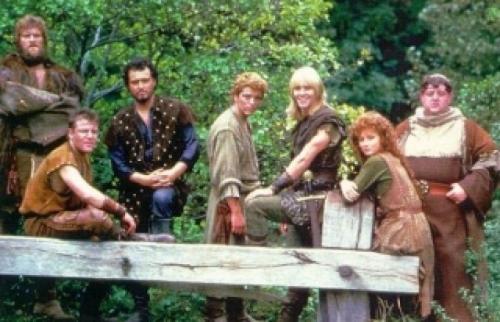
“Robin of Sherwood” season 3 cast
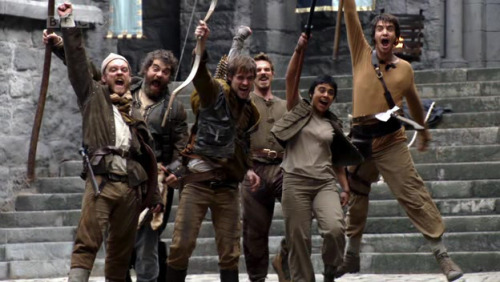
“Robin Hood BBC” season 1 cast
The biggest reason that I’ve got for watching both shows is that they both take the same approach to the characters in Robin Hood’s gang. Both are small groups (I think both shows make the same joke about there being 5-7 in the gang) which allows for plenty of focus on their individual interactions. Most Robin Hood movies show just about hundreds of men and only introduce you to a couple of them, but both of these shows go in depth to the 6 or so characters they create. It’s a wonderful change of pace.
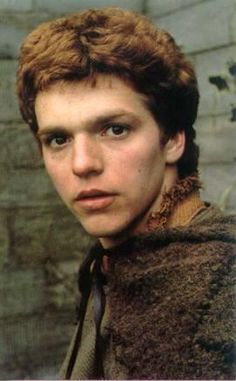
“Robin of Sherwood” Much
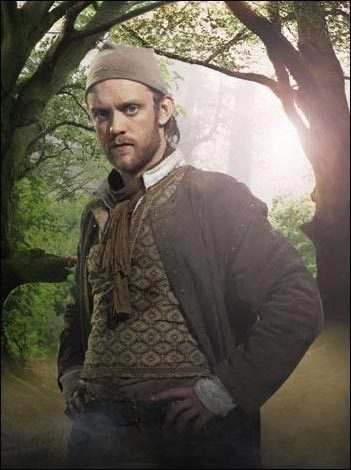
“Robin Hood BBC” Much
Beyond that, the characterizations of the outlaws are rather similar. There is no way that “Robin Hood BBC” didn’t take some ideas from “Robin of Sherwood” which I’m going to get into more under the cut. But I think the best example of this is with Much. Your typical Robin Hood adaptation doesn’t have any particular connection between Much and Robin, usually Much is just kinda around or something. Both of these shows make Much and Robin very close. With “Robin of Sherwood” they are adoptive brothers as Robin was raised by the miller after his father’s death. In “Robin Hood BBC” Much is Robin’s loyal servant who went with him to the Holy Land and back. Either version expands Much more than is typically done (pun only a little intended heehee).
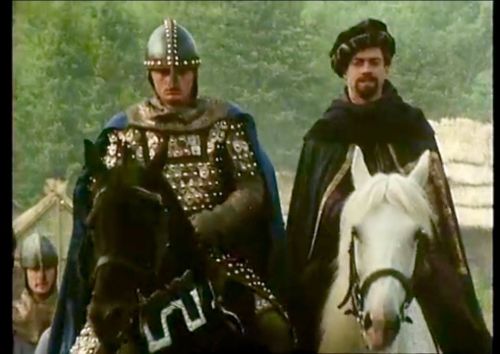
“Robin of Sherwood” Sir Guy and the Sheriff
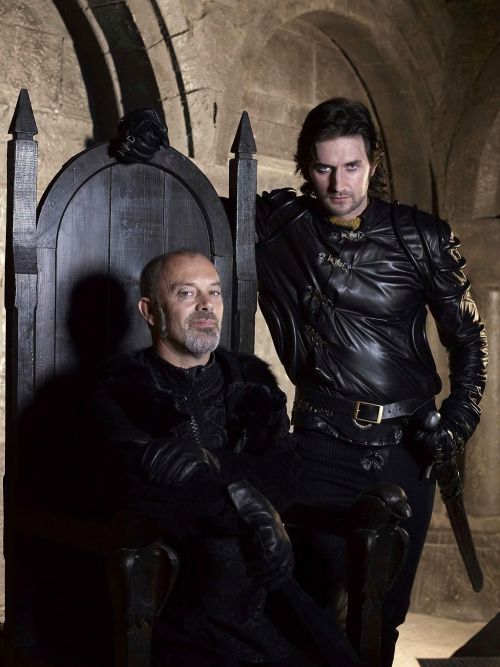
“Robin Hood BBC” the Sheriff and Sir Guy
Then there’s the Sheriff of Nottingham and Sir Guy. I’ll be honest, I think “Robin of Sherwood” wins for the gayest of the two. There are scenes where the two are literally in tubs next to each other, or the Sheriff giving Guy orders from the tub. There’s even an instance where the Sheriff makes Sir Guy dry him off after a bath! In “Robin Hood BBC” the Sheriff definitely harasses Guy, but not to the same extent, probably because of the GuyxMarian love triangle they were going for. It’s freaking hilarious to see what happens to their relationship as soon as that disappears though!
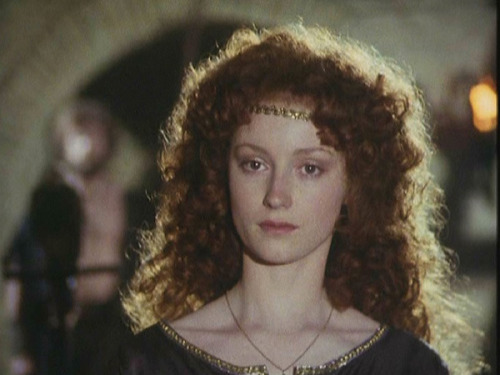
“Robin of Sherwood” Marian
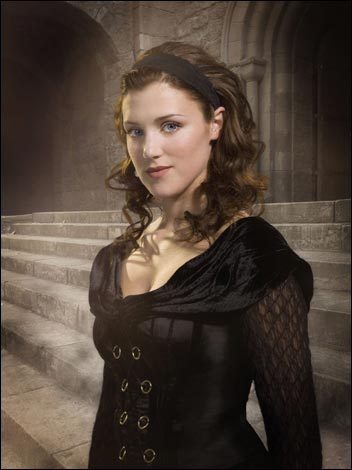
“Robin Hood BBC” Marian
And I’d be remiss if I didn’t talk about Marian. I adore the Marian in “Robin Hood BBC” and the fact that she is a vigilante in her own right. But the thing that frustrates me SO MUCH about her character is that she never truly leaves the castle to join Robin Hood in the woods. “Robin of Sherwood” skips all that BS, Marian spends the bulk of the show out in the woods with the outlaws and it’s awesome. She’s a total badass, and the best part (to me) is that the love triangle isn’t a thing! So no Guy creeping around her (he creeps around other ladies)! Both shows present an excellent version of Marian and they compliment each other super well.
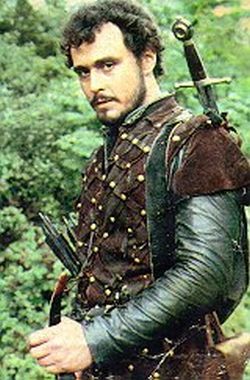
“Robin of Sherwood” Nasir
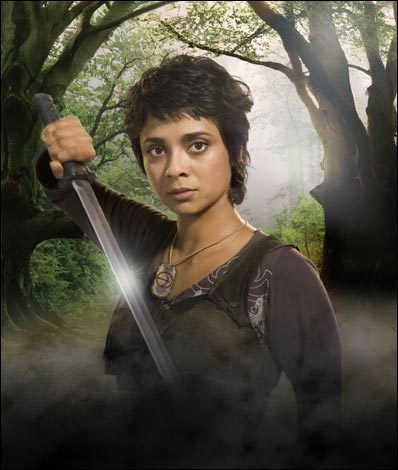
“Robin Hood BBC” Djaq
Finally I want to talk about the inclusion of a Saracen in the gang of outlaws. In “Robin Hood BBC” that’s Djaq, the incredibly clever and strong Saracen lady who is taken over as a slave and then joins the gang. But the thing is that Djaq would not exist if it weren’t for Nasir, the Saracen from “Robin of Sherwood.” This show was the first instance of a Saracen joining the gang. Basically he clicked really well with the cast, and didn’t look too bad either, so they kept him around for the rest of the show. And now almost every Robin Hood adaptation has a Saracen included in the group of outlaws as well, it’s such a cool example of how this myth is still growing and changing even in the present day. So if you’re a Djaq fan (and you better be) you should definitely check out Nasir because he’s the reason she exists.
One last point about the shows in general before I hide the rest. A major complaint about “Robin Hood BBC” is how it really isn’t that historically accurate. The show just didn’t have the budget for it, so they made do with what they could. The result is… entertaining at the least. “Robin of Sherwood” is the opposite where the writers made a point to try and make it as true to history as they could. So costumes and props are all accurate, and actual events that happened during the 12th century are peppered throughout. The result is a beautiful version of what “Robin Hood BBC” could have been with a little more money.
Alright, plot comparisons and spoilers below. You have been warned. I hope though that if you’ve only seen one of these shows that I have convinced you to check out the other!
There are numerous similarities between the plots of both shows. I’ve said it before and I’ll say it again: “Robin Hood BBC” definitely took several of their ideas directly from “Robin of Sherwood” and you cannot convince me otherwise. Lack of images due to a lack of decent screencaps, but you’ve probably seen the episodes already.
Let’s start with the season 1 finale. I’ll go over “Robin of Sherwood” first and then “Robin Hood BBC.” In “Robin of Sherwood” King Richard returns to England, befriends Robin Hood, and pardons the outlaws. He even tries to make Robin part of his court. By the end Robin bails because he doesn’t want to be the king’s pawn, Marian gets shot as they run away, but is miraculously brought back to life!
In “Robin Hood BBC” they get news that the king is returning to England which means that Marian must now marry Sir Guy. She decides to rob him first, leading to her getting stabbed and nearly dying. Somehow she miraculously survives. They expose the king to be a fraud, stop the wedding, and save the day!
The similarities are obvious, both involve King Richard returning to England (which is then revealed to be not as great as the characters initially thought) and Marian dying and then coming back to life. Now you would be correct to point out that a Robin Hood story only has so many big cards to pull for an emotional season finale, and naturally two of them are the king returning and the audience’s love of Marian. But this is basically the same plot at the same point in both of the shows, you can’t tell me that that’s just a coincidence.
In “Robin Hood BBC” they get news that the king is returning to England which means that Marian must now marry Sir Guy. She decides to rob him first, leading to her getting stabbed and nearly dying. Somehow she miraculously survives. They expose the king to be a fraud, stop the wedding, and save the day!
The similarities are obvious, both involve King Richard returning to England (which is then revealed to be not as great as the characters initially thought) and Marian dying and then coming back to life. Now you would be correct to point out that a Robin Hood story only has so many big cards to pull for an emotional season finale, and naturally two of them are the king returning and the audience’s love of Marian. But this is basically the same plot at the same point in both of the shows, you can’t tell me that that’s just a coincidence.
Moving on to the emotional wreckage that are the season 2 finales. “Robin of Sherwood” ends season 2 by killing off Robin Hood himself. The actor wanted to move on to other projects, so they killed him off in an emotional standoff.
“Robin Hood BBC” ends it’s season 2 by Guy killing Marian who was trying to protect the king. It’s also brutal and emotional and horrible ugh thanks guys.
Alright so they both decide to go balls to the wall and kill off a major character. To be honest, I think that there’s less ripping off going on here, “Robin of Sherwood” did this out of necessity to let the actor leave while “Robin Hood BBC” I think did it for more plot-related reasons. But it is still a fascinating parallel, and how “Robin of Sherwood” handled the title character leaving I think is much more interesting.
“Robin Hood BBC” ends it’s season 2 by Guy killing Marian who was trying to protect the king. It’s also brutal and emotional and horrible ugh thanks guys.
Alright so they both decide to go balls to the wall and kill off a major character. To be honest, I think that there’s less ripping off going on here, “Robin of Sherwood” did this out of necessity to let the actor leave while “Robin Hood BBC” I think did it for more plot-related reasons. But it is still a fascinating parallel, and how “Robin of Sherwood” handled the title character leaving I think is much more interesting.
So “Robin of Sherwood” decided to keep the show going by turning the figure of Robin Hood into a legacy character. Another man takes his place as the outlaw hero. (Sidenote: this also means that they can resolve the conflicting theories about how Robin could be either a common man or a noble, and similarly how he has connections to both Locksley and Huntingdon. The first Robin in a commoner from Locksley and the second is the Earl of Huntingdon’s son. It’s really quite elegant.) And that is definitely what they planned on doing at the end of season 3 of “Robin Hood BBC.” Again, the actor wanted to leave and do something else so they had to kill him off. But they set up Archer as the next man to be in charge of the gang. I’m a real big fan of not giving “Robin Hood BBC” a season 4 since season 3 sucked soooo bad, but I’m almost certain that it would have played out similarly to season 3 of “Robin of Sherwood” when they have to pass that mantle onto a different actor as well. Additionally, I think both shows have a scene where Robin points to members of the gang and says that if he were to die, they would all carry on without him (”you are Robin Hood! and you are Robin Hood!”) so the idea that this is about more than one man is present in both. It’s a cool theme for both shows.
Finally one last point that is unrelated to a season finale. Both shows reveal at some point that Robin Hood and Sir Guy are related. They are half-brothers in “Robin of Sherwood” and they share a half-brother in “Robin Hood BBC.” Quite honestly I find this hilarious, mainly because it’s handled so poorly in “Robin Hood BBC.” But if you watch the “Robin of Sherwood” episode, there’s a subplot where Will and Much think they’ve come into contact with leprosy. And in the “Robin Hood BBC” version Guy’s father is a leper. It’s like the BBC writers only understood half of the original episode and then wrote “Bad Blood!”
Feel free to hmu if you’ve seen both shows and want to add to this list! I love discussing different adaptations of stories.
Subscribe to:
Comments (Atom)